Retired educator Belinda Hosli Tipton had a history of migraine headaches, but the one she suffered on July 1 was different. She woke up during the night with an excruciating headache and heart palpitations. She soon lost control of her body and yelled to her husband, Jeff, for help. After she’d reached the hospital, tests confirmed that she’d suffered a stroke.
Now on the road to recovery, she urges other women to pay close attention to their bodies’ subtle cues.
HER HEALTH CHALLENGE
(On the night of my stroke), I was between grabbing my heart with my left hand and the back of my brain with my right hand. I thought I was going to die before I could get to my husband ….
All I could say was, “Please, I need help, honey! “
He immediately went into his medical mode, as he is a nurse practitioner.
“Honey, I need you to move fast toward the Jeep as quickly as you can! I have to get you to the emergency room now! You are having a stroke! …”
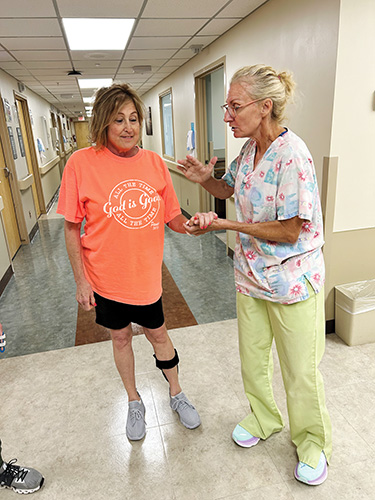
The initial imaging was negative for a hemorrhagic stroke or blocked arteries, but due to the symptoms, they performed an MRI that confirmed I’d had a stroke. They immediately saw five individual strokes in the brain: four small ones on the top part of the brain and one larger stroke in the pons, which is at the stem of the brain. Jeff and I were in shock and devastated. It was not until they got me back to my hospital room that we realized my left-sided weakness went to paralysis.
THE WARNING SIGNS
My husband immediately recognized the symptoms to look for using the acronym “BE FAST.” Some strokes can be prevented by controlling blood pressure, cholesterol and blood sugar, as well as abstaining from smoking, staying active and maintaining a healthy weight. However, a stroke can’t always be prevented and being aware of the signs and seeking medical attention early can be key in post-stroke outcome and recovery.
Signs and symptoms include sudden difficulty walking or balancing, dizziness or coordination loss, sudden confusion or difficulty understanding others, sudden onset of a severe headache/migraine, sudden slurring of speech, sudden loss or change in vision and sudden numbness or weakness on one side of the body. Do not skip nor forget your daily meds!
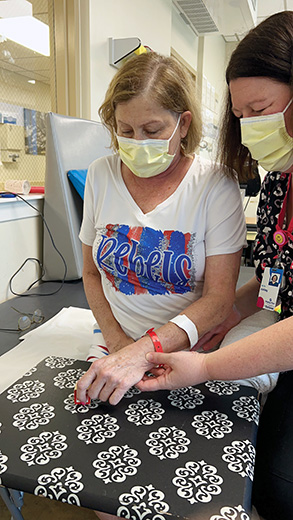
HER CONTINUING STRUGGLE
My struggle has been like a storm that will not stop; it is still a physical and emotional rollercoaster. I have had to learn to talk clearly without slurring my words and relearn how to walk. I still struggle with the use of my left arm, hand and fingers, and I now have double vision. Thankfully, I was able to stay in Singing River Pascagoula Hospital Rehab/ CRC for 21 days with the best neuro rehab team I have ever met (speech therapist, occupational therapist and physical therapist). Each day consisted of three grueling hours of therapy. I’m still doing 18 outpatient therapy sessions through Singing River Rehab, Gulfport.
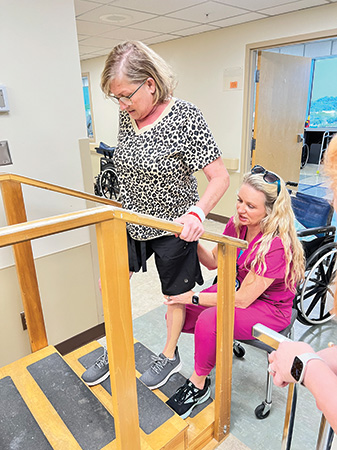
WHERE SHE STANDS TODAY
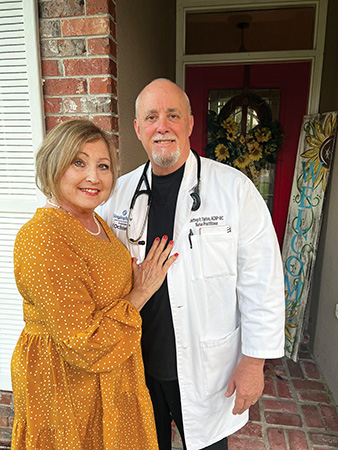
I am only seven weeks out from my stroke, and I am making progress daily. I was told it may take six months to a year to make full recovery. Jeff and I are grateful for the support system that we have had through this journey; we couldn’t have made it without them. We have learned that things can change in an instant! Be aware of your body, and do not ignore any unusual signs that something may be wrong. Your body may be telling you something.
How to spot a stroke: BE FAST
- Balance: Sudden loss of coordination or balance
- Eyes: Sudden change in vision
- Face: Sudden weaknesses of the face
- Arms: Sudden weakness of arms or legs on one side
- Speech: Sudden difficulty speaking
- Time: Time to call 911 and get to an ER immediately


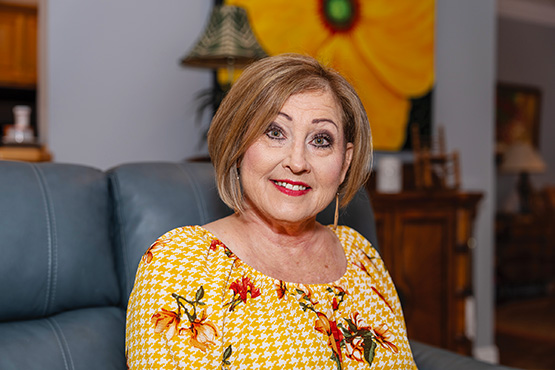
One Comment
Leave a Reply